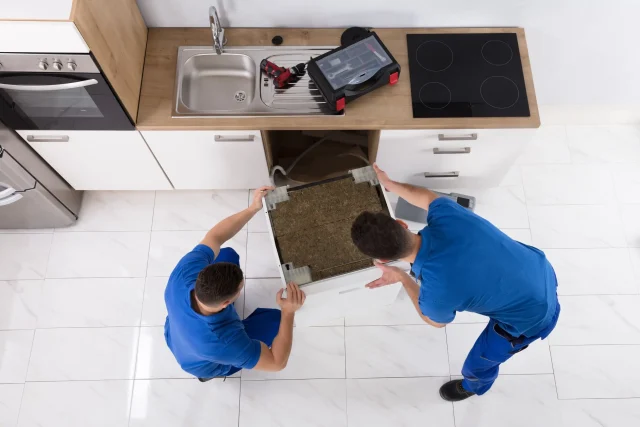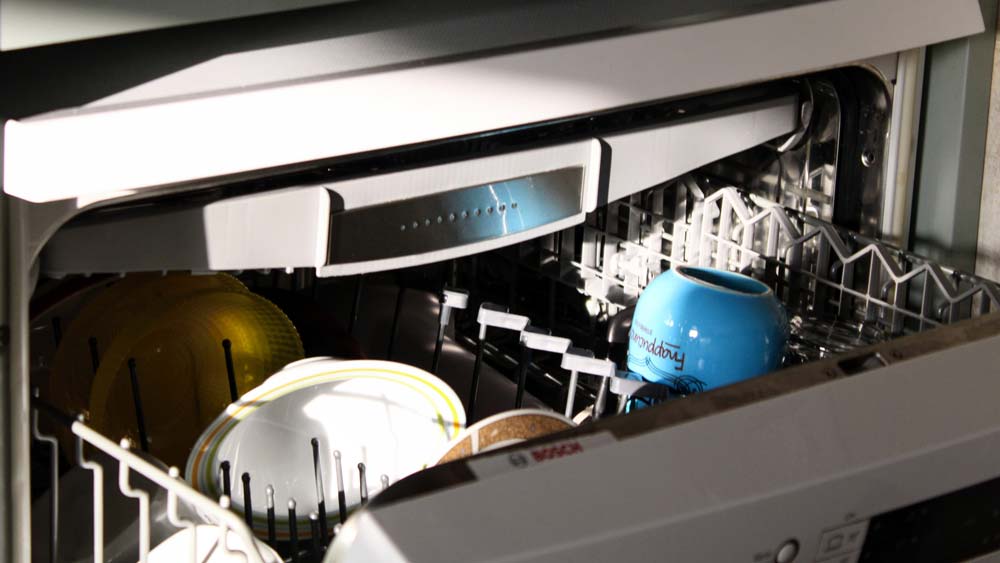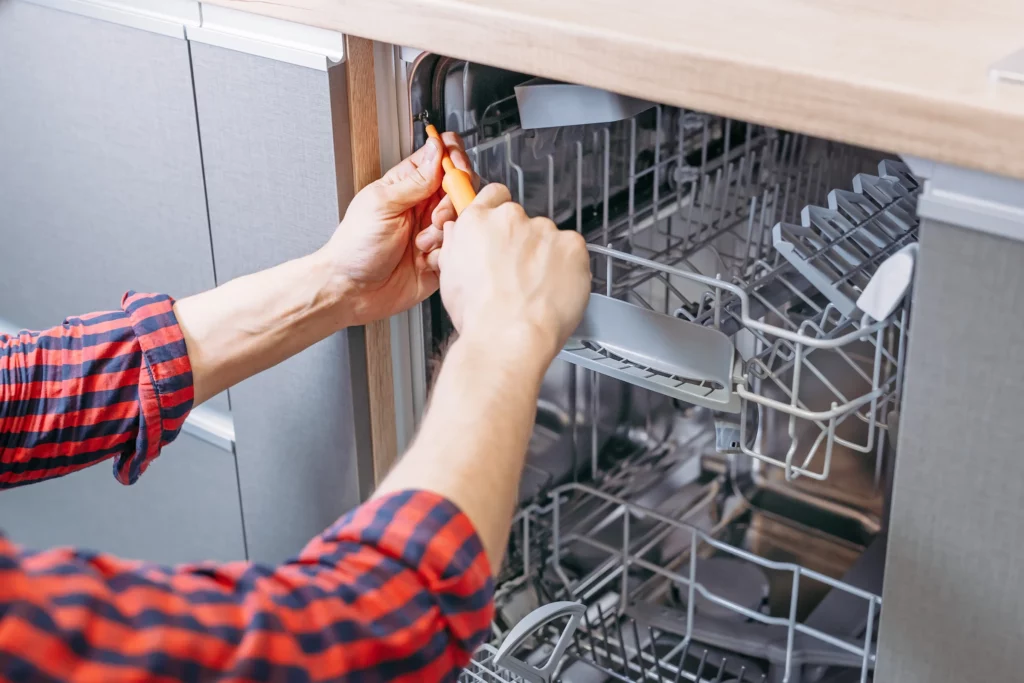
How to Diagnose and Fix Your Broken Dishwasher
Experiencing a dishwasher breakdown is the last thing anyone wants when the sink is full of dishes and they’re trying to figure out how to get them all done in a timely fashion.
But here’s the thing.
Trying to troubleshoot a broken dishwasher without some kind of guide can very quickly leave you stranded in hot-water, running circles around the problem without being able to even identify it.
This is exactly why we decided to put together this guide, to help you diagnose your broken dishwasher and get back on the road to recovery sooner rather than later.
But here’s the thing.
Trying to troubleshoot a broken dishwasher without some kind of guide can very quickly leave you stranded in hot-water, running circles around the problem without being able to even identify it.
This is exactly why we decided to put together this guide, to help you diagnose your broken dishwasher and get back on the road to recovery sooner rather than later.
Appliance breakdowns happen! But you don’t have to be helpless.
Here are some steps that you can take to figure out what’s wrong, find a solution, and get back to cleaning those dishes faster than you can say ‘abracadabra.’
To use this guide, simply find the problem you’re experiencing, then go down the list of solutions to find the issue you’re dealing with. If you need help figuring out if it’s worth it to fix the problem from a cost-benefit perspective, check out this guide.
To use this guide, simply find the problem you’re experiencing, then go down the list of solutions to find the issue you’re dealing with. If you need help figuring out if it’s worth it to fix the problem from a cost-benefit perspective, check out this guide.
Problem: The Dishwasher Doesn’t Start
Solutions:
Check The Power
Make sure that the dishwasher is plugged in and that the circuit breaker isn’t tripped.
Check The Touch Pad
Make sure that the buttons are working properly and that you’re using the proper controls to start a cycle. If needed, consult the owner’s manual for instructions.
Check The Door Latch
Make sure that the door is closed properly. Also, make sure your dishwasher isn’t on “lock control.” If it is, it won’t start.
Check The Power
Make sure that the dishwasher is plugged in and that the circuit breaker isn’t tripped.
Check The Touch Pad
Make sure that the buttons are working properly and that you’re using the proper controls to start a cycle. If needed, consult the owner’s manual for instructions.
Check The Door Latch
Make sure that the door is closed properly. Also, make sure your dishwasher isn’t on “lock control.” If it is, it won’t start.

Problem: Your Dishwasher Doesn’t Start, And Makes Humming Sounds
Solution: Check For Leakage, Then Repair Or Replace The Part That’s Causing The Problem
On most dishwashers, this is a sign of a leakage.
Consult the section titled “Problem: Your Dishwasher Is Leaking,” located further down in this guide, for a rundown of how to diagnose and fix this issue.
Consult the section titled “Problem: Your Dishwasher Is Leaking,” located further down in this guide, for a rundown of how to diagnose and fix this issue.

Problem: Your Dishwasher Doesn’t Drain
Solutions:
Check The Filter
Make sure that the filter is clean and free of debris.
Check the Drain Pump
First, make sure that food particles are not preventing it from running.
Do you hear humming sounds that sound like the drain pump is trying to work, but it isn’t working? If so, it may be a sign that you need to replace the pump.
Check the Drain Hose
Make sure that the drain hose isn’t clogged.
Check the Garbage Disposal
If you’ve recently had plumbing work done and your dishwasher is connected to garbage disposal, check to make sure it’s installed properly.
If your garbage disposal is plugged up, this could keep your dishwasher from draining as it should.
Check The Filter
Make sure that the filter is clean and free of debris.
Check the Drain Pump
First, make sure that food particles are not preventing it from running.
Do you hear humming sounds that sound like the drain pump is trying to work, but it isn’t working? If so, it may be a sign that you need to replace the pump.
Check the Drain Hose
Make sure that the drain hose isn’t clogged.
Check the Garbage Disposal
If you’ve recently had plumbing work done and your dishwasher is connected to garbage disposal, check to make sure it’s installed properly.
If your garbage disposal is plugged up, this could keep your dishwasher from draining as it should.
Problem: There’s No Water Making It Into The Dishwasher
Solutions:
Check Your Water Housing
Make sure it’s securely connected and that the water is turned on.
Check the Water Inlet Valve
Do you hear any sounds when water is supposed to pour in? If not, then you may need to replace the water valve.
Check Your Water Housing
Make sure it’s securely connected and that the water is turned on.
Check the Water Inlet Valve
Do you hear any sounds when water is supposed to pour in? If not, then you may need to replace the water valve.
Problem: The Dishwasher Doesn’t Wash the Dishes Very Well
Solutions:
Check the Spray Arms
Make sure that the spray arms are not clogged with debris.
Check the Water Level
Make sure that the water level is set correctly. If there’s not enough water for the dishwasher to operate, it won’t wash. You can check this by just pouring a couple of glasses of water inside the dishwasher. When the proper water level is reached, close the door and see what happens next.
Check Your Circulation Pump
Make sure that the circulation pump is working properly. if it’s not clogged and you hear humming sounds a few minutes after starting a cycle, this may be a sign that you’ll need to replace the pump.
Check the Spray Arms
Make sure that the spray arms are not clogged with debris.
Check the Water Level
Make sure that the water level is set correctly. If there’s not enough water for the dishwasher to operate, it won’t wash. You can check this by just pouring a couple of glasses of water inside the dishwasher. When the proper water level is reached, close the door and see what happens next.
Check Your Circulation Pump
Make sure that the circulation pump is working properly. if it’s not clogged and you hear humming sounds a few minutes after starting a cycle, this may be a sign that you’ll need to replace the pump.
Problem: The Door Drops Too Hard
Solutions:
Check the Dishwasher Sitting Level
The dishwasher should be leaned back in order to function properly. If it’s leaning forward, you may need to adjust the feet to ensure that it’s tilted back.
Check the Door Springs
Make sure that the door springs are properly adjusted, and adjust, fix, or even replace if needed.
Check the Door Hinges
In addition to faulty door springs, faulty door hinges can also cause a dishwasher door to drop too hard. The door hinges are responsible for holding the door in place and allowing it to open and close smoothly. If the hinges are bent or damaged, the door may not be able to close properly, or it may drop down too quickly when you open it.
Check the Dishwasher Sitting Level
The dishwasher should be leaned back in order to function properly. If it’s leaning forward, you may need to adjust the feet to ensure that it’s tilted back.
Check the Door Springs
Make sure that the door springs are properly adjusted, and adjust, fix, or even replace if needed.
Check the Door Hinges
In addition to faulty door springs, faulty door hinges can also cause a dishwasher door to drop too hard. The door hinges are responsible for holding the door in place and allowing it to open and close smoothly. If the hinges are bent or damaged, the door may not be able to close properly, or it may drop down too quickly when you open it.
Problem: Your Dishwasher Is Leaking
Solution:
If your dishwasher has a pan underneath, check the pan. If there’s water in the pan, clean it out and start a cycle. Try to detect where the water is coming from. That’ll help you to figure out exactly what might be causing the issue.
If you can identify the source of the leak, this will give you a massive clue into exactly how to diagnose and fix the problem.
There are a number of malfunctions that can lead to a dishwasher leaking. Some of these include:
If your dishwasher has a pan underneath, check the pan. If there’s water in the pan, clean it out and start a cycle. Try to detect where the water is coming from. That’ll help you to figure out exactly what might be causing the issue.
If you can identify the source of the leak, this will give you a massive clue into exactly how to diagnose and fix the problem.
There are a number of malfunctions that can lead to a dishwasher leaking. Some of these include:
- Damaged door gasket
- Loose or damaged water supply line
- Faulty Water inlet valve
- Damaged drain hose [as opposed to a clogged drain hose]
- Faulty water inlet valve
- Faulty drain pump
- Faulty water circulation pump
- Diverter motor [this won’t be a factor on all brands]
- Main sump seal assembly
Looking for Professional Repair?
years of experience
0
+
days warranty for labor
0
+
customer satisfaction
0
%
FAQs
What are the most common dishwasher problems?
The most common dishwasher problems are typically as follows:
- Failure to start
- Doesn’t drain
- Doesn’t wash the dishes well
- Leakage
- Strange noises
What is the Average lifespan of a dishwasher?
The average lifespan of a dishwasher tends to be about 10-12 years. However, this can vary greatly depending on a number of factors, such as the brand, the model, how often the dishwasher is used, and how well it’s maintained.
Should You Try To Diagnose Your Own Dishwasher Issues? Or Call A Professional?
Whether you should try to diagnose your own dishwasher issues or call a professional depends on a few factors, including your confidence in your own DIY skills, the severity of the problem, and the cost of a professional repair.
Some people feel a lot more comfortable taking things apart and searching for the root cause of the issue than others. For some people, the idea of taking apart a dishwasher to look for the source of a leak sounds daunting and overwhelming. Thus, the best way to answer this problem is to use the following formula:
Some people feel a lot more comfortable taking things apart and searching for the root cause of the issue than others. For some people, the idea of taking apart a dishwasher to look for the source of a leak sounds daunting and overwhelming. Thus, the best way to answer this problem is to use the following formula:
- If you feel comfortable and confident with a DIY approach, then try that first (as long as you know you won’t be voiding your warranty by doing so)
- If you DON’T feel 100% comfortable and confident with a DIY approach, then consider contacting a professional to help you diagnose and fix the issue
We here at Denver Appliance Repair have been diagnosing and fixing dishwasher issues for years. We’ve literally diagnosed and fixed thousands of these appliances—and we’d love to help you get to the bottom of your dishwasher woes quickly and efficiently.
So feel free to reach out and contact us to set up an appointment.